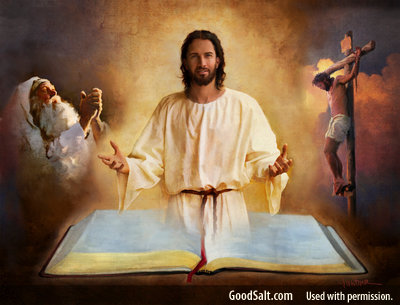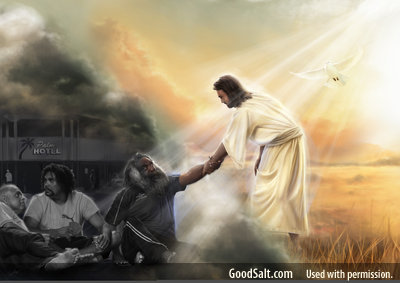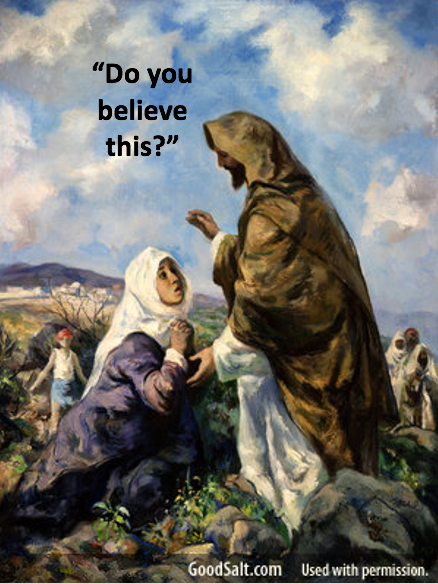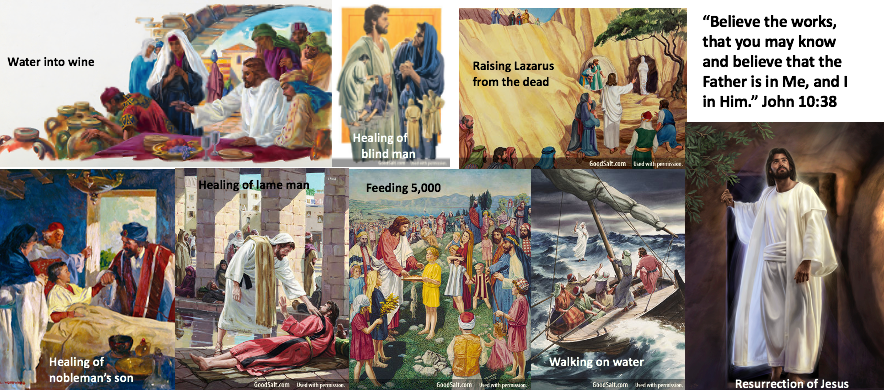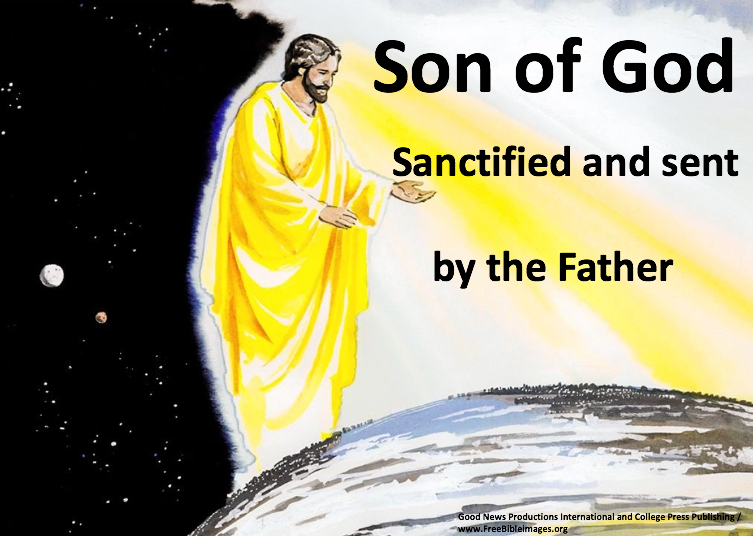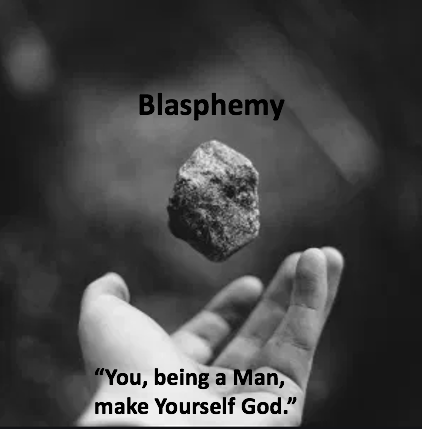“25Jesus said to her, ‘I am the resurrection and the life. He who believes in Me, though he may die, he shall live. 26 And whoever lives and believes in Me shall never die. Do you believe this?’ ” John 11:25-26
As we are studying the historical record of Jesus’ seventh miraculous sign in the gospel of John (John 11:1-44), we are learning reasons why the Lord may allow a situation to grow worse after we pray about it. So far we have learned that the Lord does this to …
– Display more of His glory (John 11:1-4).
– Declare His love toward us (John 11:5-6).
– Deepen our sensitivity to His will (John 11:7-10).
– Develop our faith in Him (John 11:11-16).
The fifth reason why the Lord may allow a situation to grow worse after we pray about it is to DISCLOSE MORE OF CHRIST’S IDENTITY TO US (John 11:17-27). The scene now shifts from the region of Bethany in Perea (John 10:40; cf. 1:28) to the Bethany in Judea (John 11:18). Both towns became locations where people believed in Jesus for His gift of everlasting life. “So when Jesus came, He found that he had already been in the tomb four days.” (John 11:17). When Jesus arrived in Bethany of Judea, He found that Lazarus had “already been in the tomb four days.” It was the custom of Jews in general to bury their dead on the same day that the person died because embalming was not practiced by the Jews 1 and because of the warm climate which would contribute to a rapid rate of decay. 2 The dead body would be washed, anointed with perfumes, and wrapped in a white cloth.
“Now Bethany was near Jerusalem, about two miles away.” (John 11:18). Jesus and His disciples traveled about forty miles from Bethany of Perea to Bethany of Judea. John informs us that Bethany of Judea was “two miles away” from Jerusalem, perhaps to explain why so “many of the Jews” from Jerusalem were there to comfort Mary and Martha (John 11:19) and to witness Jesus’ miracle (cf. John 11:45-46).
“And many of the Jews had joined the women around Martha and Mary, to comfort them concerning their brother.” (John 11:19). It was expected of Jews to console the bereaved. In the Jewish culture, the period of mourning for the dead lasted thirty days. The first three days, no work was done, only weeping took place. Dr. Tom Constable writes, “Jewish rabbis believed that the spirit of a person who had died lingered over the corpse for three days, or until decomposition of the body had begun. They believed that the spirit then abandoned the body because any hope of resuscitation was gone.” 3 The rest of the first week there was deep mourning. The remaining thirty days involved lighter mourning.
When someone dies, it is so encouraging to see an entire community show support to those who are left behind. This support make take the form of a sympathy card, a visit, a meal, a cry with the bereaved or a tender hug.
“Then Martha, as soon as she heard that Jesus was coming, went and met Him, but Mary was sitting in the house.” (John 11:20). Everyone deals with death differently and that is okay. The personality differences of the two sisters are seen here in their response to Lazarus’ death. Martha is active and assertive going out to meet Jesus. She seeks Christ in her grief. Mary, on the other hand, is quiet and contemplative, sitting at home. Jesus consoles each sister differently, taking into consideration their differing personalities.
“Now Martha said to Jesus, ‘Lord, if You had been here, my brother would not have died.’ ” (John 11:21). Martha is saying, “Lord, You could have prevented this. We sent word to you before Lazarus died. You could have come immediately and prevented his death. But no! You waited two more days and Lazarus died. We needed You, Lord. Why didn’t You come?!” Notice that Martha’s faith was limited to whether Jesus was there.
But Martha did not let her anger and disappointment cut off her relationship with the Lord. She said to Jesus, “But even now I know that whatever You ask of God, God will give You.” (John 11:22). She still believed Jesus could meet her need.
Jesus reassures her. “Your brother will rise again.” (John 11:23). He is referring to what He is about to do. He does not rebuke her for expressing her anger or disappointment. Jesus understands our humanness and the need to deal with feelings when faced with a loss. He dealt with losses, too. He had already lost John the Baptist (cf. Matthew 14:10-13).
Martha responds to Jesus, “I know that he will rise again in the resurrection at the last day.” (John 11:24). Martha did not realize that Jesus was talking about raising Lazarus from the dead immediately. She thought He was referring to the final resurrection when the Messiah-God comes to set up His Kingdom (cf. Job 19:25-27; Daniel 2:44-45; 7:9-14, 26-27; 12:1-3).
Have you ever felt like Martha did near the grave of a loved one? You are angry with God for letting your loved one die. Maybe you prayed to God to save your spouse or child from death, and God let him or her die. Your heart was broken in two. It felt like God punched you in the gut! You were so overwhelmed with sadness and then anger. Why would God let this happen? What might Jesus say to you near your loved one’s grave? I believe He might say the same thing He said to Martha.
“I am the resurrection and the life. He who believes in Me, though he may die, he shall live.” (John 11:25). This is the fifth “I AM” statement by Jesus in the gospel of John (cf. John 6:35; 8:12; 10:9, 14; 11:25) whereby He claims to be the same God who appeared to Moses at the burning bush (Exodus 3:13-14). Jesus is the Guarantor of both resurrection and life.
As “the Resurrection” (John 11:25), Jesus guarantees a future resurrection to all who believe in Him. The person who believes in Christ “shall live” again physically through resurrection even “though he may die” physically. As “the Resurrection,” Jesus guarantees a future bodily resurrection to all who believe in Him. When Jesus comes back for His Church, all believers in Him will receive glorified resurrection bodies that will be free from sin and death (cf. I Corinthians 15:35-56; I Thessalonians 4:13-18).
Next, as “the Life,” Jesus guarantees that “whoever lives and believes in Me shall never die.” (John 11:26a). This phrase, “shall never die,” is extremely powerful. Christ guarantees that all who believe in Him shall “never” experience eternal death or separation from God. How long is “never”? It is forever. The moment a person believes in Jesus, he or she receives “life” from Him that can “never” be taken away from him or her.
Jesus had made similar promises in the gospel of John which include “shall never hunger,” (John 6:35), “shall never thirst” (John 4:14; 6:35), “shall never perish” (John 10:28), and “shall not come into judgment” (John 5:24). Christ guarantees that the moment a person believes in Him for everlasting life, he or she is secure forever!!! What this also means is even though Lazarus had died physically, he was still alive spiritually because he had believed in Jesus.
Jesus makes this promise to “whoever lives and believes in” Him. We may be surprised to see the words “whoever lives.” Usually Jesus says, “whoever believes in Him” (John 3:15-16; 4:14). Why does Jesus add the words “whoever lives” as a condition for this promise? Dr. Bob Wilkin explains, “Jesus only offers His life to living human beings who believe in Him. He does not extend eternal life to nonhumans (Satan, fallen angels, demons); nor does He extend eternal life to humans who die in unbelief.” 4 Christ does not offer eternal life to people after they die. The Bible says, “And as it is appointed for men to die once, but after this the judgment.” (Hebrews 9:27). There are no second chances to get to heaven after we die. This life is the only opportunity people have to get right with God through faith alone in the Lord Jesus Christ alone. Reincarnation is not found in the Bible. Jesus’ promise is made to living human beings (“whoever lives”), not to those who have died.
Let’s look at Jesus’ evangelistic invitation to Martha. He said to her, “Do you believe this?” (John 11:26b). Christ is asking Martha (and us), “Do you believe I guarantee a future resurrection and never-ending life to those who believe in Me?” This question is rarely asked of non-Christians today by Christians who practice evangelism. Instead, they ask the non-Christian questions like…
– “Have you turned from your sins?”
– “Have you been baptized with water?”
– “Have you surrendered your life to the Lord Jesus?”
– “Have you given your life to Christ?”
– “Have you asked Jesus into your heart?”
– “Have you confessed Jesus as your Lord?”
No mention of the word “believe” is made in these common invitations. This is not what Jesus did with Martha. If we want to become more like Jesus, we must evangelize the lost the same way that He did. He asked Martha, “Do you believe this?” – that I am the Resurrection and the Life Who guarantees a future resurrection and never-ending life to those who believe in Me?
Look at Martha’s response. “Yes, Lord, I believe that You are the Christ, the Son of God, who is to come into the world.” (John 11:27). She did not say “I think I believe…” nor does she say, “Maybe I believe…” She said, “Yes, Lord, I believe…” Martha was convinced that Jesus was the Christ – the One who guarantees a future resurrection and never-ending life to all who believe in Him. Could Martha believe that Jesus was the Christ without realizing she herself had eternal life? No. To believe that Jesus was the Christ was to believe His guarantee of eternal life. To doubt His guarantee of eternal life was to doubt Jesus as the Christ. If a person does not believe he or she is eternally secure the moment he or she believes in Jesus for eternal life, then he or she has not understood Jesus’ offer.
Some people think it is not enough to believe in Christ for eternal life. They think you must also turn from your sins, confess your sins, invite Jesus into your heart, surrender to the Lord, be baptized, continue in good works, obey all of God’s commands, and the list goes on and on and on. But this is foreign to the gospel of John which was written specifically to tell non-Christians how to obtain eternal life (John 20:31). Ninety-nine times John uses the word “believe” in his gospel. 5 If we want to become more like Jesus, we must use the word that God uses the most in evangelism – “BELIEVE”!!!
Many people today make a distinction between head faith and heart faith. They have told us that we can miss heaven by eighteen inches because we have believed in Jesus with our head but not with our heart. But where does the Bible make this distinction? It does not. Nowhere in the Bible does God distinguish head belief from heart belief. All belief is belief. If we believe in Christ for eternal life, then we know we have eternal life because Jesus guarantees, “He who believes in Me has everlasting life.”(John 6:47).
To doubt that we “truly believe” is to disbelieve Jesus’ promise. Either I believe Christ’s promise or I do not. If I do, I have eternal life. If I do not, I stand condemned as one who “has not believed in the name of the only begotten Son of God” (John 3:18). The gospel of John does not condition eternal life on whether one has “heart belief” instead of “head belief.” Saving faith is the conviction that Christ died for my sins and rose from the dead, and then believing or trusting in Him alone for His free gift of eternal life. What makes saving faith saving is not the amount or uniqueness of the faith, but Whom your faith is in and What your faith believes. Saving faith results instantly in eternal salvation because it believes in the right object: the promise of eternal life to every believer by Jesus Christ Who died for our sins and rose from the dead (John 3:15-18; 6:40, 47; I Corinthians 15:1-8; et al). Therefore, those who refer to “head belief” or “heart belief” are reading into the word “believe” as the Bible neither does, nor provides basis for doing.
When Martha answered Jesus’ question with, “Yes, Lord, I believe that You are the Christ, the Son of God, who is to come into the world” (John 11:27), neither she nor Jesus analyzes her faith to distinguish head faith from heart faith. Martha confidently affirms that Jesus is “the Christ, the Son of God, Who is to come into the world.” What Martha believes about Jesus is exactly what John says in his purpose statement is all that a person must believe to have everlasting life (John 20:31). She knows she has believed in Christ, the Son of God, and therefore she is certain she has eternal life.
Does Jesus correct Martha’s response? Does He caution her to wait and see if her faith is real (as so many do today) through the manifestation of good works or fruit first before making such a statement? Does He ask her if she believes in her “heart” and not merely in her “head”? He does not because as long as any sinner comes to believe that Jesus is “the resurrection and the life,” that is, “the Christ, the Son of God,” he or she knows they have everlasting life.
What would Martha’s faith be like if Jesus had not delayed, and hence, had not raised Lazarus from the dead? Her understanding of Christ’s Person and power would be less. But because Jesus did not get there in time to heal Lazarus, Martha came to know that Jesus is “the Resurrection and the Life.”
One of the reasons God allows our situations to worsen after we pray about them is so He can reveal more of Himself to us. So instead of getting discouraged when God is silent, we can expect Him to reveal more of Himself to us.
The story is told of an atheist who was spending a quiet day fishing on a lake when suddenly his boat was attacked by the Loch Ness monster. With one easy flip of his tail, the beast tossed the man and his boat high into the air. Then the Loch Ness monster opened his mouth to swallow both the atheist and his boat. As the man sailed head over heels, he cried out, “Oh, my God, help me!” At once the ferocious attack scene froze in place, and as the atheist hung in midair, a booming voice came down from the clouds saying, “I thought you didn’t believe in Me?” The man pleaded, “Come on, God, give me a break. I didn’t believe in the Loch Ness monster either.”
Even when a person is facing death, God can reveal more of Himself to that person so that in the case of the atheist, he can believe in the Lord. Maybe you have been praying a long time about a situation and it seems to get worse and worse. Take heart, God may be about to reveal more of Himself to you.
Prayer: Lord Jesus, some of us may be standing beside the grave of a loved one right now. And like Martha, we may be disappointed or even angry with You for allowing our loved one to die after we prayed to You to save him or her from death. Thank You for reminding me today that You know how it feels when a loved one dies. You wept when You saw the grief that was caused by Your dear friend’s death (John 11:35). You sometimes delay Your answers to our prayers to reveal Yourself to us in a deeper and more powerful way like You did with Martha. You showed Martha (and us) that You are “the Resurrection and the Life” by raising her brother from the dead so that she could know that You have the power to provide a future bodily resurrection and never-ending life to all who believe in You alone. Thank You, my Lord and my God, for reminding me that all I must do to receive a future bodily resurrection and never-ending life is to believe in You alone. Please help me to be clear when I share this message with non-Christians. Thank You for reminding me that I need to use the same word You used the most in evangelism – BELIEVE. In Your holy and precious name I pray, Lord Jesus. Amen.
ENDNOTES:
1. J. Carl Laney, Moody Gospel John Commentary (Chicago: Moody Press, 1992), pg. 207.
2. Dr. Tom Constable, Notes on John, 2015 Edition, pg. 202.
3. Ibid., pg. 201.
4. Dr. Robert Wilkin, The Grace New Testament Commentary: Revised Edition (pg. 507). Grace Evangelical Society. Kindle Edition.
5. John 1:7, 12, 50; 2:11, 22, 23; 3:12(2), 15, 16, 18(3), 36(2); 4:21, 39, 41, 42, 48, 50, 53; 5:24, 38, 44, 46(2), 47(2); 6:29, 30, 35, 36, 40, 47, 64(2), 69; 7:5, 31, 38, 39, 48; 8:24, 30, 31, 45, 46; 9:18, 35, 36, 38; 10:25, 26, 37, 38(3), 42; 11:15, 25, 26(2), 27, 42, 45, 48; 12:11, 36, 37, 38, 39, 42, 44(2), 46, 47; 13:19; 14:1(2), 10, 11(2), 12, 29; 16:9, 27, 30, 31; 17:8, 20, 21; 19:35; 20:8, 25, 29(2), 31(2).

